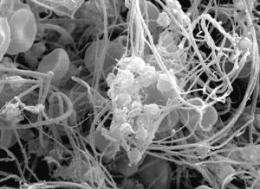Blood cell breakthrough could help treat heart disease

(Phys.org) -- Scientists at the University of Reading have made a groundbreaking discovery into the way blood clots are formed, potentially leading to the development of new drugs to treat one of the world's biggest killer illnesses.
Cardiovascular disease, which causes heart attacks and strokes, accounts for one in three of all deaths in the UK, often brought about by clots blocking major blood vessels, preventing critical blood flow to the heart or brain.
Now researchers at the Institute for Cardiovascular and Metabolic Research (ICMR) at the University of Reading have uncovered, for the first time, the mechanism by which platelets, the blood cells that cause clots, ‘communicate' with each other and the inner walls of blood vessels when clotting.
The clotting process helps the body to repair itself and stops wounds from bleeding. But inappropriate activation of platelets leads to the formation of clots in the bloodstream (thrombosis), which can lead to a potentially fatal heart attack or stroke.
Currently, doctors treating heart disease can administer drugs which reduce the tendency of the blood to clot, and therefore decrease the risk of thrombosis. However, such anti-thrombotic drugs are not effective for some patients, and can cause dangerous side-effects.
Professor Jonathan Gibbins and Dr. Sakthivel Vaiyapuri have headed up an international team of researchers that have discovered how platelets use specialised pore-like structures, called gap junctions, allowing direct communication between the cells. These structures have been studied previously in other cells that are in constant contact with each other, but the researchers said their role in platelets was a ‘big surprise'.
The scientists, whose findings are published online in the journal Circulation, conclude that the discovery could lead to the creation of innovative new drugs to prevent or treat thrombosis.
Professor Gibbins said: "This appears to be a very important communication mechanism for blood clotting and thrombosis. Since we have found that molecules that block these channels reduce thrombosis this may pave the way for potential new avenues for the development of more effective anti-thrombotic therapies to prevent heart attacks and strokes."
Dr. Vaiyapuri said: "Although this area of platelet research is still in its early stages, this is an exciting discovery. The pore proteins have important functions in a range of cell types in the body, and therefore in the future it will be important to consider how to modulate the opening and closing of the pores specifically in platelets. "

















